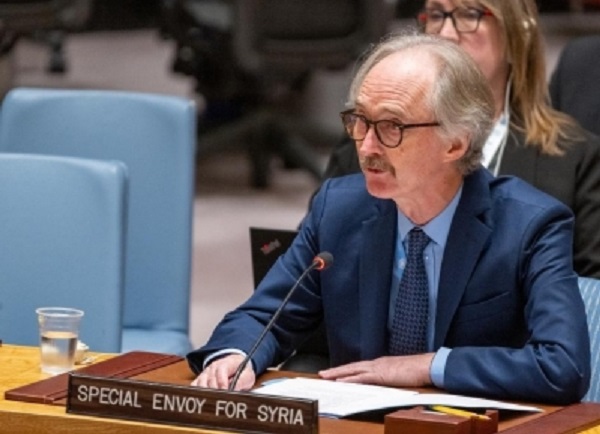United Nations, (Samajweekly) UN Special Envoy for Syria, Geir Pedersen, has said that the situation in Syria is so unprecedented that it calls for leadership, bold ideas and a cooperative spirit.
“A political solution is the only way forward for Syria. We may not be able to reach that in one step. But I believe we can progress toward it gradually,” he told the Security Council in a briefing on Thursday.
The status quo is unacceptable. The renewed diplomatic attention on Syria, including in the region, and the shared suffering of all Syrians in the aftermath of the earthquakes create new obligations and opportunities, he said.
“If all parties engage, I believe we can move forward.”
Last week saw the awful milestone of 12 years since the start of the conflict in Syria. A Syrian-owned, Syrian-led, UN-facilitated political process supported by the international community is more essential than ever, said Pedersen through a video link.
A political solution must restore Syria’s sovereignty, independence, unity and territorial integrity, and meet the legitimate aspirations of the Syrian people, he added.
“We must move down this path, even if in stages. I am ready to use my good offices, develop proposals, and convene the necessary players in an effort to help facilitate the way forward, consistent with my mandate in Security Council Resolution 2254.”
Pedersen said it is absolutely vital to continue to provide resources to support the emergency response to last month’s earthquakes. There is also a need for a sustained calm on the ground, especially in areas affected by the earthquakes, Xinhua news agency reported.
The week after the earthquakes saw signs of such calm emerging, with a relative lull in violence in most quarters. For brief moments, the unimaginable became real: parties on each side of the front line largely refraining from hostilities. Since then, there has been a creeping rise in incidents, he added.
The logic for the moves from different sides in the humanitarian sphere in the aftermath of the earthquakes can and must be applied to address post-earthquake rehabilitation and broader political challenges, said Pedersen.
“We have seen two crossing points (for the delivery of humanitarian aid), long closed, reopened, and new openings on sanctions. This shows that different sides can make constructive moves. I sense, from all the discussions I have had, that there is an opportunity to move forward with additional moves on all sides beyond the immediate emergency.”
He said a degree of cooperation across divides is essential if the way forward is to be found.
The Syrian government, the Syrian opposition, the Western players, the Arab players, the Astana players, other interested parties — none alone can move this forward. Individual approaches will not make the kind of qualitative difference that a coordinated approach could make, he said.
“But if all are prepared to put practical points on the table, and if players coordinate and work together, I am more convinced than ever that it is possible and essential to move forward — step for step and step by step.”









